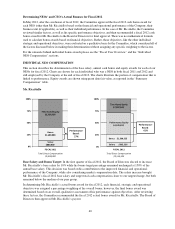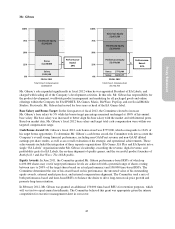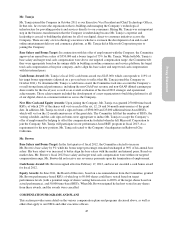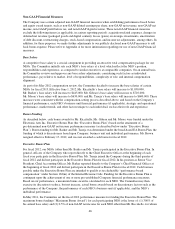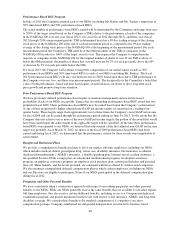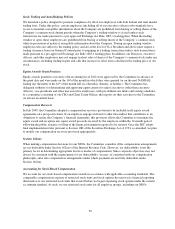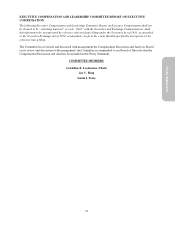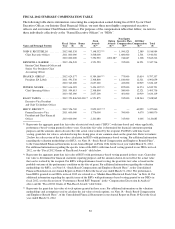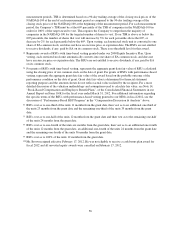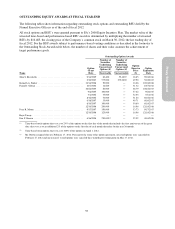Electronic Arts 2012 Annual Report Download - page 58
Download and view the complete annual report
Please find page 58 of the 2012 Electronic Arts annual report below. You can navigate through the pages in the report by either clicking on the pages listed below, or by using the keyword search tool below to find specific information within the annual report.Stock Trading and Anti-Hedging Policies
We maintain a policy designed to promote compliance by all of our employees with both federal and state insider
trading laws. Under this policy, certain employees (including all of our executive officers) who regularly have
access to material, non-public information about the Company are prohibited from buying or selling shares of the
Company’s common stock during periods when the Company’s trading window is closed (unless such
transactions are made pursuant to a pre-approved Exchange Act Rule 10b5-1 trading plan). When the trading
window is open, these employees are prohibited from buying or selling shares of the Company’s common stock
while in possession of material, non-public information about the Company. During an open trading window,
employees who are subject to the trading policy and are at the level of Vice President and above must request a
trading clearance from our General Counsel prior to engaging in a trading transaction (unless such transaction is
made pursuant to a pre-approved Exchange Act Rule 10b5-1 trading plan). In addition, our Directors, executive
officers, and other employees may not engage in short sales of shares of the Company’s common stock under any
circumstances, including trading in puts and calls that increase in value from a decline in the trading price of our
stock.
Equity Awards Grant Practices
Equity awards granted to executive officers during fiscal 2012 were approved by the Committee in advance of
the grant date and were made on the 16th of the month in which they were granted (or on the next NASDAQ
trading day thereafter if the 16th of the month fell on a Saturday, Sunday, or holiday). The Committee has
delegated authority for determining and approving equity grants for senior executives (other than executive
officers), vice presidents and other non-executive employees, with pre-defined size limits and vesting schedules,
to a committee consisting of our CEO and Chief Talent Officer, that reports on their activities to the Committee
on at least an annual basis.
Compensation Recovery
In July 2009, the Committee adopted a compensation recovery provision to be included in all equity award
agreements on a prospective basis. If an employee engages in fraud or other misconduct that contributes to an
obligation to restate the Company’s financial statements, this provision allows the Committee to terminate the
equity award and recapture any equity award proceeds received by the employee within the 12-month period
following the public issuance or filing of the financial statements required to be restated. Once the SEC adopts
final implementation rules pursuant to Section 10D of the Securities Exchange Act of 1934, as amended, we plan
to modify our compensation recovery provision appropriately.
Section 162(m)
When making compensation decisions for our NEOs, the Committee considers if the compensation arrangements
are tax deductible under Section 162(m) of the Internal Revenue Code. However, tax deductibility is not the
primary factor in determining appropriate levels or modes of compensation. Since corporate objectives may not
always be consistent with the requirements for tax deductibility, we may, if consistent with our compensation
philosophy, enter into compensation arrangements under which payments are not fully deductible under
Section 162(m).
Accounting for Stock-Based Compensation
We account for our stock-based compensation awards in accordance with applicable accounting standards. The
comparable compensation expense of restricted stock units and stock options has removed a financial reporting
disincentive to use restricted stock units that existed before we began expensing stock options under the current
accounting standard. As such, we use restricted stock units for all employee groups, including our NEOs.
50


